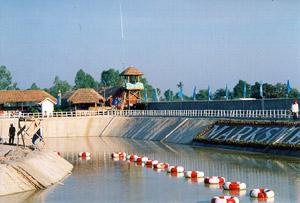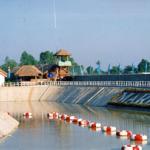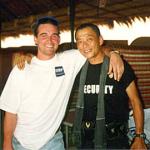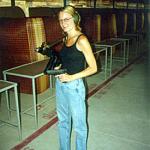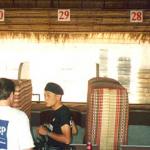Christmas in Cambodia
There was an idyllic window of opportunity, post-1997 coup, pre-1998 elections, when Cambodia was a safe place to visit. Safety, of course, is a relative term. According to the U.S. State Department at the time, Cambodia was a "hot spot." Travel warnings abounded. But compared to Rwanda and Bosnia-Herzegovina, also on the "hot spot" list, a jaunt to Phnom Penh was a stroll in the park.
My trip would serve multiple purposes. I lived in Saigon and it was time to renew my work visa. I was in the midst of writing a historical novel based on the 1923 looting of the Cambodian temple of Banteay Srei. And at the ripe age of 31, I was going to experience my first Christmas away from my family. I would have shot myself in the head rather than spend this sentimental holiday watching a herd of tinsel-bedecked expats getting drunk in a bar in downtown Saigon. My boyfriend Sam had suggested Cambodia as an opportune alternative.
Picking up a Vietnamese visa is not an expeditious process and Sam and I were required to spend two full days in Phnom Penh before heading to the temples. After depositing my paperwork at the Vietnamese embassy that first morning, we opened our guidebook and pursued an absurdly incongruous tour of the city: the emotional exhaustion of the Tuol Sleng Holocaust Museum and the Killing Fields, the anesthetic release of massages at the Juliana Hotel and the dank, consoling mustiness of the National Museum.
By sundown we were slumped in low rattan chairs in the Foreign Correspondent's Club overlooking the river. Back when visa runs were still de rigeur for expats in Saigon, the club was notorious. Every expat visiting the capital stopped in for a Tiger Beer and the latest scoop on Cambodia's whimsical political situation. Peter Arnett sightings were common.
Sam and I stared into the pale night. We did not want to dwell on what we had seen that day. Living in Saigon had made us more than familiar with the atrocities of the region. We escaped by focusing on the dilemma of how to spend the following day.
Sam and I are not enthusiastic decision-makers when we go on holiday and Phnom Penh does not teem with tourist attractions. We'd eaten earlier at a cafe called the Globe. The owner, a dwarf from Canada, had been in-country for eight months. He'd regaled us with descriptions of his favorite pastime: go-kart racing at a track just outside town. Sam and I lazily agreed that this seemed like our best bet. Glad to have the future settled, I excused myself to the restroom.
As I passed the pool table, I saw a stack of bright yellow flyers on a ledge. Next to a photograph of a young westerner wearing army fatigues and a beret, with a machine gun slung over his shoulder, was the following invitation:
"Let's shoot together Now. You know how to do this? So Marksmen club is all yours. You don't know but you want to try. Here! Here we are! Just look at the Map. You hate to do this and people who like it. Congratulations!!! You are our best client, Just come and you'll know why."
A list of seventeen available semi-auto and automatic rifles followed. Weapons included a 9mm Baretta, a 38 Special Smith & Wesson and a 9mm UZI Mini.
Sam laughed at my suggested change of plans. Why not? We hadn't been too gung-ho about go-karts anyway. And what better way to spend a day in Cambodia than at some hokey, touristy shooting range called the Cambodia Eagle Force Marksmen Club?
Sam and I were far beyond finding adventure in jolting over rutted third world roads on the backs of Honda motorcycles and so the following morning we hired a driver and one of Cambodia's ubiquitous Toyota Camrys from the Department of Tourism. We'd been assured that our driver knew where he was taking us, but I was a skeptic and clutched the directions. As we passed Pochentong Airport and turned onto Road Four, I began scanning the roadside for signs.
Obliviously, our driver whizzed past the sheet of plywood heralding our destination. I tapped his shoulder and the Camry skidded onto the shoulder. Our driver ground the car into reverse and wheeled into the side road. Tarmac quickly deteriorated to dirt. The road narrowed. Rice fields spread over the flat land toward the horizon. Houses balanced on stilts. Families ambled in our dusty wake.
The Marksmen Club emblem of two crossed rifles hung innocuously on a bamboo fence. A guard in the booth at the front gate waved us in with scarcely a glance. Sam and I saw a tank and felt an immediate affinity with the place. Tanks were a familiar sight in Saigon. Once, we'd attended an open-air wedding where one track of a tank was used as a shelf to house the wine and beer boxes behind the bar.
The drive through the walled compound encircled a small, man-made lake. Samples of military transportation perched on small cement platforms. Obviously, the owner of the club entertained delusions of theme park grandeur. This was Disneyland for the Rambos of the world. The range itself, at the end of the compound, could have fallen directly off a movie set. A long thatch awning shaded a row of padded shooting booths. The booths faced a field filled with sandbags, stacked tires and targets.
The difference between the actual range and my expectations was size. The Marksmen Club was massive. I counted over fifty cubicles. The target area consumed at least an acre of land. A fortress of dusty, gray sandbags severed the range from the surrounding landscape.
Ours was the only car parked in the small stretch of dirt in front of the booths. We stepped into the hazy daylight and were faced by a posse of men wearing black fatigue pants, black berets and black T-shirts that declared their status as security. They stopped fiddling with a stack of guns on a bench. Silently, they stared at us. A German shepherd loped from behind a small office.
Sam and I refrained from glancing at one another. This was not Cu Chi, an hour out of Saigon, where tourists can pay a dollar to a man in a white shirt and khakis to shoot a carefully restrained AK-47 at a crumbling target shaped like an elephant.
"Hey there, welcome to the Marksmen Club." The voice sounded as if it had tumbled through gravel and whiskey. The accent was American, but the features of the forty-year-old man sauntering after the German shepherd were distinctly Asian. He too wore the black uniform, sans the beret. A checked Khmer scarf flopped round his neck. He held out his hand, amiably. "How can I help you?"
"We're here to shoot," said Sam. "Hey, that's great. We don't officially open until New Year's Eve. How'd you hear about us?" I showed him the flyer.
"That thing," he laughed. "A crazy Russian friend of mine put it together and we didn't have the heart to tell him how silly it is." He handed Sam a business card that said "Victor Chau, Cambodia Eagle Force Commanding Officer, Marksmen Club, Managing Director, Honorary Goodwill Ambassador."
Victor was a Chinese-American from New York City. He had come to Phnom Penh three years earlier to help a friend revive a failing hotel. He now co-owned the Manhattan Dance Club on Monivong Boulevard. This shooting range was his newest idea. The government sanctioned it; in fact there was a military base down the road, and as for the neighbors--well, they'd been through so much already, they didn't care. "We help them out," Victor assured us, "we give 'em food, money for schools, things like that. Would you like a beer? A beer always helps you shoot better."
A westerner pulled away from the cluster of Cambodian security men. He had the silken skin of adolescence. His manner, when looking at a person, was removed, but precise, as if he was staring at you down the long barrel of a rifle. A scar drew the skin tight on the right side of his neck. That he was from Bulgaria was all the biography we were allowed. His job was to prepare weapons for us.
Meanwhile Victor introduced us to Vixie, the German shepherd. Proudly, he showed me the restrooms. They were inarguably the cleanest toilets in Southeast Asia and I found these civilized facilities--located directly in the line of fire of the sniper practice tower--almost as creepy as the arsenal of guns.
We donned ear protection and Sam put on goggles. The Bulgarian led Sam into the nearest booth. He offered Sam a 9mm HK MP-5 automatic rifle. Politely, he explained how to ready the gun and aim. He did not step away as Sam pulled the trigger. A round of fire sprayed a battalion of targets.
"Great shot," shouted Victor, the gracious host. He grabbed my camera and leaped onto one of the booth walls to take some close-ups of Sam. "You're a natural." Sam hurried back to me and whispered, "Look at my hands." Adrenaline roared through his body, and his hands were shaking. His grin was uncontrolled, enormous.
Sam and I had no particular fascination with guns. But there was something mesmerizing about Victor and his paramilitary playground. The contradictions seduced us. Victor, the genial militant. Vixie nudging our calves with a moist friendly nose. The brotherly camaraderie between the security men. Even the Bulgarian; although he frightened the hell out of us, we couldn't deny a certain gentleness in his demeanor.
A pair of Chinese tourists arrived. AK-47's poked out of their Jansport backpacks. Victor instructed two of his security men to take them to the far end of the range. "AK's are loud," he told us, "and I'm already pretty deaf."
Watching the Chinese stroll away, Sam asked Victor which gun was his favorite. Victor sorted through his supply of Parabellums and Ruger Super Redhawks, grinned and extracted his pride, his ultimate joy. A 9mm Glock. It was a handgun and looked wimpy compared to the big toys, but looks can be deceiving.
"These babies are government-issue," Victor said, "They don't give out more than ten to a country. They cost five thousand dollars apiece. This," he divulged, lowering his voice to a conspiratorial growl, "is the ultimate anti-terrorist weapon. You'll never shoot through the wall of a plane with one of these."
A semi-automatic, hand-held machine gun. Sam eyed it hungrily. He asked, "How'd you get it?" "A general, a friend of mine. I didn't collect guns until I came to Cambodia. We had quite an influx of inventory from the July situation." His eyes gleamed with excitement as he gazed into the past. "People were selling cheap and getting out fast. I picked up some nice pieces."
The July situation was the 1997 coup that cleaved the bipartisan government and caused a rash of the violence that is so endemic in Cambodia. Victor gazed out at the range. "It was a crazy time. My partner and I were worried about looting, so we barricaded the nightclub with sandbags. A few idiots poked their heads over. We took a few shots, scared 'em away," he sighed, nostalgically.
Although Sam was interested in Victor's story, he couldn't bear it any longer. He was desperate to shoot the Glock. It wasn't as easy to sight as the HK; it required time, but Sam fell in love, firing off both single, echoing shots and bone-rattling rounds.
While Sam imagined himself as an invincible commando, one of the security men jogged over from where the Chinese tourists were popping off their AK-47's. The two men consulted and then Victor said, "Send someone out to apologize to the villagers and tell those guys to stop shooting over there."
Victor's nonchalance was impressive, but I didn't have a chance to pursue the subject of poor aim. Sam insisted that I had to try shooting at least once. "Oh, yeah, you'll love it," encouraged Victor and the Bulgarian nodded. It was decided, in consensus, that I would shoot the HK. The shoulder-high walls of the booth were padded and covered in woven mats. Each target was at least twenty-five yards away to guarantee protection from the kickback. The Bulgarian leaned around me and helped balance the gun on my shoulder. He whispered into my ear, how to work the safety, how to hit a bull's eye. I could feel his breath on my neck as I aimed and pulled the trigger.
Bull's eye.
And I understood completely the desire to race through a field, screaming at the top of your lungs, firing as fast as you can at anything that moves. I should have been ashamed of myself--I've always been a firm believer that the leaders of the NRA should be lined up against a wall and shot. But I was too busy shooting and I was having a blast. When I ran out of ammunition, I couldn't hide my disappointment. Victor nodded with great understanding and scooted a beer in my direction.
The sun drifted into the far horizon of sandbags. A mist of dust turned the sky a tempestuous shade of red. Sam and I stared longingly at the targets. We still had fifteen guns left to try. But it was time to leave. Victor offered to escort us back to the city. "It's probably a good idea this time of night."
Which was the lesser of two evils? Braving the rural Cambodian night alone? Or attaching ourselves to a jeep filled with UZI enthusiasts and an arsenal of machine guns? As our Toyota pulled into the road behind the jeep, Sam and I instinctively slid low in our seats, so that the tops of our heads were just below window level.
We made it back to the Champs-Elysees Guesthouse in one piece and over dinner, we debated whether or not to join Victor later on at his nightclub. "Drinks are on me," he'd said as we were leaving the Marksmen Club. It had seemed like the cordial thing to agree to at the time, but now we hesitated. Back in the safety of our hostel, the shooting range was already metamorphosing into a zany anecdote to embellish extensively for our friends back home. Would we be pushing our luck and courting danger by continuing to keep Victor's company? But he'd been so hospitable, cheering every time we hit a target.
Eventually, we concluded that since we had to get up at five the next morning to catch the boat to Siem Reap, we should probably make it an early night. Sheepishly, we assured one another that Victor would understand.
All photos ©
 ThingsAsian
ThingsAsian